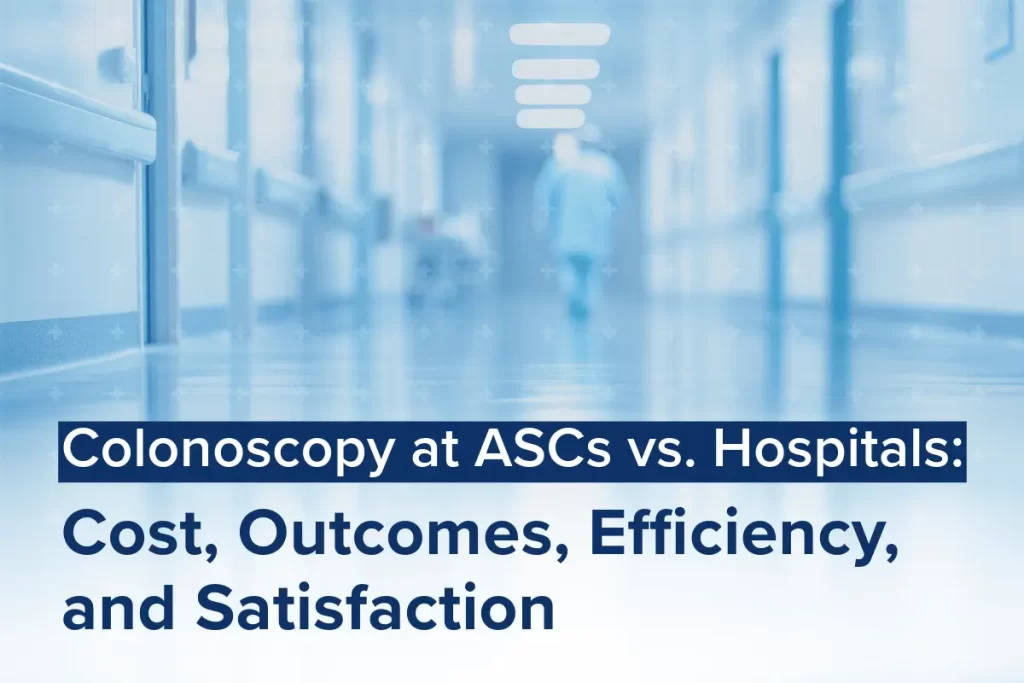Table of Contents
ToggleSchedule Your Procedure Today
- All-Inclusive Service
- Board-Certified Physicians
- Transparent Pricing
A Colonoscopy is a common procedure that can be performed in different settings, and choosing where to go can make a big difference in cost and experience.
For patients paying out-of-pocket (without insurance), understanding how ambulatory surgery centers (ASCs) compare to hospitals on price, quality, efficiency, and patient satisfaction is crucial.
Pricing Differences
Colonoscopy prices vary widely by setting, and hospitals generally charge significantly more than ASCs for the same procedure.
Studies have found that hospital outpatient departments often have facility fees about 50–60% higher than those charged by ASCs for colonoscopies, a gap that directly impacts self-pay patients.
In one analysis, the average colonoscopy at a hospital outpatient department cost around $1,608, compared to about $1,136 at an ASC. For a colonoscopy involving polyp removal, hospitals charged roughly $1,967 on average versus $1,346 at an ASC, illustrating how much an uninsured patient could save by choosing an ASC.
Another study noted that screening colonoscopies (routine preventive exams) were about 32% more expensive in hospital settings, while diagnostic colonoscopies (to investigate symptoms) cost roughly 58% more at a hospital than at an ASC.
Without an insurer negotiating rates, these differences mean a self-pay patient might save hundreds or even thousands of dollars by opting for the lower-cost ASC setting.
Patient Outcomes
When it comes to safety and health outcomes, colonoscopies at ASCs are just as safe as those done in hospitals. Large studies have found no significant differences in complication rates between the two settings , for example, an analysis of 174,000 Medicare patients showed no statistical difference in 30-day post-colonoscopy complications for hospital vs. ASC patients.
Overall, serious complications from colonoscopy are very rare in both settings (occurring in well under 1% of cases).
One recent analysis of over 1.6 million procedures found the 90-day complication rate averaged only about 0.7%, and notably, hospitals had a slightly higher rate of post-procedure issues than ASCs (about 0.20 percentage points more).
Efficiency (Time-to-Discharge and Scheduling)
Ambulatory surgery centers are purpose-built for efficiency in outpatient care. They have streamlined operations and scheduling, with no emergency-room cases bumping the schedule, so patients often experience shorter wait times and fewer delays compared to hospital facilities.
Many ASCs pride themselves on maintaining on-time surgery schedules, which can be a relief for patients taking time off work for their colonoscopy.
The time from procedure to discharge is often faster at an ASC as well. Since these centers focus only on same-day cases with relatively healthy patients, individuals are usually cleared to go home soon after they wake up from sedation, without the prolonged observation periods that might occur in a hospital.
In practical terms, patients can typically complete their check-in, colonoscopy, and recovery and be on their way home within a few hours.
ASCs also tend to perform a high volume of procedures efficiently. In fact, one study found the average ASC handled about 134% more colonoscopies per year than the average hospital outpatient department.
This high throughput reflects the focused nature of ASCs and can translate to easier scheduling and quick turnarounds for patients. Without the complexities of a full-service hospital, ASCs can often offer more flexible scheduling (including early morning or weekend slots) and a generally more streamlined experience.
Patient Satisfaction
Patients generally report positive experiences with colonoscopies in both hospital outpatient departments and ASCs, but ASCs often earn slightly higher satisfaction scores.
National patient surveys show that ASCs outperformed hospitals on all measured domains of patient experience, from communication with doctors and nurses to overall facility ratings. This means that, on average, patients felt even better cared for in the ASC setting.
For instance, in one large survey of same-day surgery patients, 87.6% of ASC patients said they would “definitely recommend” the facility to friends or family, compared to about 82.1% of hospital outpatient patients. Nearly all patients in both settings reported that they were treated well by staff and that the facility was clean (over 96% in each case), but ASCs still edged out hospitals on these metrics.
This slight advantage in patient satisfaction reflects the more personalized and convenient care environment that ASCs strive to provide, with shorter waits and a dedicated outpatient focus.
Final Thoughts
ASCs can offer a very compelling option. They generally provide the same high-quality outcomes as hospitals with significantly lower costs and a more convenient, efficient process.
Patients at ASCs report equal or better satisfaction with their care. In summary, choosing an ASC for a colonoscopy allows self-pay patients to save money without sacrificing safety or experiencel.
Ready to Schedule Your Affordable Colonoscopy?
ColonoscopyAssist makes colonoscopies easy and affordable. We connect uninsured and underinsured patients with high-quality outpatient procedures, offering all-inclusive pricing.
Disclaimer
Before making any decisions regarding anesthesia, sedation options, colonoscopies, or any medical procedure, always consult with your physician, anesthesiologist, or qualified healthcare provider. This article should not be used as a substitute for professional medical advice, diagnosis, or treatment.
EXCELLENT rating
Based on 2125 reviewsTrustindex verifies that the original source of the review is Google. I was referred to ColonoscopyAssist through my healthcare sharing ministry. They communicated with me every step of the way and were a lower-cost solution to getting a colonoscopy since my preventative screenings aren't covered. I got mine done through a very reputable endoscopy group and they were wonderful.Trustindex verifies that the original source of the review is Google. The entire process was seamless and the staff was friendly and professional. Overall. I had a wonderful experience at your facility.Trustindex verifies that the original source of the review is Google. After the initial, sign up with ColonscopyAssist, it took about 2-3 weeks to get a call from doctors office and appt was 2 weeks later. Everything went smoothly, the doctor was not personable but was professional. Glad it is done. Now my husband has peace of mind.Trustindex verifies that the original source of the review is Google. Simple and easy with great savings.Trustindex verifies that the original source of the review is Google. ColonoscopyAssist was very helpful, responsive, and made the process happen smoothly, not to mention made the procedure much more affordable.Trustindex verifies that the original source of the review is Google. This was as easy as it could have been! Competent and Professional are words that come to mind. This is a great program. From beginning to end it proceeded without a glitch!Trustindex verifies that the original source of the review is Google. Everything worked well before, during and after procedure. Got lots of information. Only ask to upgrade the guide when people are taking tables and not a liquid prep.Trustindex verifies that the original source of the review is Google. very professional and friendly service, everything was organized and I was advised on all the steps. they made this process simple.


















